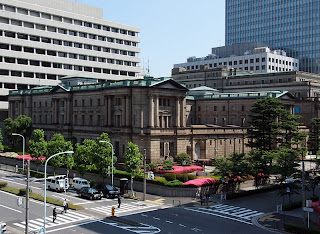The monetary easing policy the Abe
administration is going to take is basically right. However, as I have mentioned so many times, a
combination of issuance of government bonds and monetary easing policy as Mr.
Mitsubashi proposes will not help pump money into real sector of the economy unless
banks lend money to corporations. This
is because banks will pump the money gained through monetary easing policy into
the financial market.
Direct assumption of the country’s debt by
BOJ makes it possible to lend money to corporations contributing to GDP. If this is mentioned, some people immediately
claim the nonsense that it would give damage to the central bank’s independence. However, if the central bank take a monetary
policy to benefit bankers and their families, that really gives a remarkable
damage to its independence. The central
bank cannot be an organization which works for the profit of a specific family
or group, or politician. Any monetary
policy should be fair and transparent and should entail accountability. Regrettably, there seems to be no such a
central bank at all.
Masatoshi
Takeshita
December
24, 2012
Bank Of Japan (photo from Wikipedia)
English translation of a Japanese article: Nikkan Gendai – December 21, 2012 –
Far
from having no independence, the Bank of Japan is already dead.
Abe’s
threat makes BOJ easily raise the white flag
<Complete acceptance of additional monetary
easing measures and inflation target>
The Bank of Japan (BOJ) has already
completely surrendered to the Abe “administration.” Whereas Abe has blatantly
urged the BOJ to accept an inflation policy, BOJ at the monetary policy meeting
on 20th unanimously decided on an additional monetary easing package
worth 10 trillion yen and virtually decided to introduce a 2 percent price hike
Abe proposes. In a word, “Abenomics”
has been swallowed. Although it has spoken
about the central bank’s independence, the BOJ has been back to its old palace
waiting woman.
The BOJ has aimed for a 1 percent hike as a
tentative “goal” for price stabilization.
However, Abe criticized that “the goal is not set in the stone.” He has clearly claimed to “have the BOJ target”
a 2 percent price hike. At first, BOJ
President Shirakawa resisted such blatant political intervention. He said that “we want the government to
respect the central bank’s independence” and with regard to a 2 percent
inflation target, he rebutted by saying that “the people don’t simply want an
inflation.” However, after the LDP won a
landslide victory, he bothered to visit Abe personally and yielded to him so
easily at the monetary policy meeting on 20th. It is far from the BOJ’s independence.
“Before the Lower House
election, there were some BOJ old boys who got furious about (the way how
Shirakawa let Abe say whatever he wanted to say) and President Shirakawa kept
on resisting Abe. However, with
two-thirds of the seats gained by the LDP and New Komeito, revision of the Bank
of Japan Law, which will strengthen the invention by the government, is about
to become realized.
Such being the case, an atmosphere (that no response should be allowed)
has been created within the BOJ. As they were worried that revision of the Law might make it
possible for the government to intervene in the personnel relations about
positions lower than the president, they tried to tentatively show their allegiance. This really shows a bureaucratic approach to defending
the organization.” (BOJ informant)
This is involved with the
election of president planned for April next year. Personnel relations on decision of BOJ
president require the approval of the Diet; approval of the Upper House and the
Lower House, respectively. The LDP and
New Komeito have 102 seats in the House of Councilors, which fall short of the
majority by 16 seats. The BOJ was too
optimistic. Seeing
the House of Councilors, however, there are many political parties which can agree
on monetary easing policy with the LDP and New Komeito. This seemed to scare the BOJ.
<Mr. Kazumasa Iwata as Next President to
be Decisive?>
Combined with Your Party (11 seats), Nihon
Ishin no Kai (3 seats) and Kokumin Shinto (3 seats), all advocates for revision
of the BOJ Law, they get the majority. However hard President Shirakawa may resist, an aggressive
advocate for monetary easing policy will be nominated a new president as Mr.
Abe expects. Mr. Kazumasa Iwata,
director of Japan Center for Economic Research, is considered to be the most
likely candidate. President Shirakawa has given up. This indicates that the BOJ wants the government
at least to grant it a right to choose its vice
president.” (Kasumigaseki official)
President Shirakawa, completely in
constraint state, made an excuse, saying “if we deepen the understanding that
there is a framework to carry out monetary policy flexibly, it has no meaning
to discuss prospect or target.”
As for an inflation target, he had good
deception, saying “we will give a conclusion at the next meeting next year.” He is just putting off the inevitable.
“How deplorable the BOJ is! The Abe administration has not yet been
formed. Mere “unofficial approach” has
made the BOJ move around. I can only say
that the BOJ itself gives up its independence.
It does not seem that they live up to their responsibility to take a
monetary policy for the people. The BOJ,
which plays ostrich, makes a fool of us.”
(Doshisha University Professor Noriko Hama specializing in international
economics)
The common people had better be prepared
for hyperinflation and protect their life.
